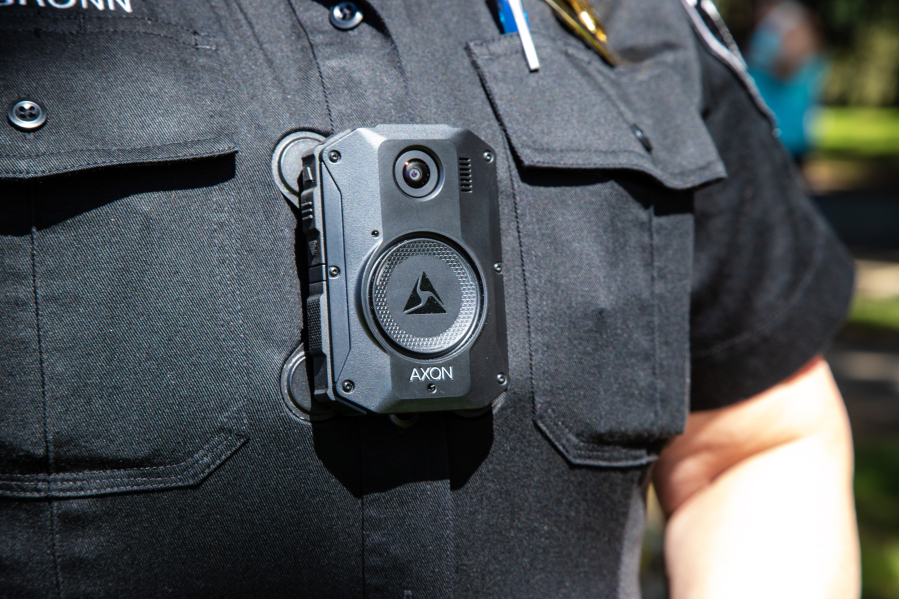The Washougal Police Department began a full-time body-worn camera program in June, joining an increasing number of departments using the technology.
The department contracted with Arizona-based Axon in 2022 to provide the equipment for a program to meet new state requirements for recording custodial interviews.
“It’s great to know that if we find ourselves in a really tricky situation, we’ve got some really great tools,” Washougal City Manager David Scott said during a Washougal City Council workshop on June 12. “Hopefully, we won’t ever need them to see how great they work, but it’s nice to know that they’re available.”
Washougal Police Chief Wendi Steinbronn said the cameras will “strengthen community trust by demonstrating our transparency and the documentation of what happens when we go out on calls.”
“Body-worn cameras have become a modern tool for policing,” she added. “Accountability is a big thing (in terms of) conduct and performance. The research that I looked at (indicates that the cameras) lead to increased civility on both sides. Officers are making sure they’re professional and patient with people, and on the other side, (if) people just want to scream and yell, that’s all going to be on video. Once they know that they’re being recorded, sometimes they tend to tamp down their behavior.”
Steinbronn — who is also serving as a temporary assistant chief for the Vancouver Police Department, which implemented a body-worn camera program earlier this year — said she hopes the cameras also will help with complaint resolution and student officer training.
“In Vancouver, we’ve been able to decline a lot of complaints that have come through without assigning them for investigation because what the people were saying the officer did and said just didn’t happen,” Steinbronn said. “And with our field-training program, when we have new student officers, we’ll be able to use the video to critique how they did on a call.”
Steinbronn said she will review video footage only under certain circumstances.
“When there’s a use of force, we’re always going to review those,” she said. “If it’s a really unusual occurrence or a media-worthy occurrence, obviously, there’s going to be a review by the supervisors and the captain and myself before it goes out.”
And police administrators will review field-training footage to give student officers feedback, Steinbronn added.
“But it’s not going to be a free-for-all,” she said. “Officers will be allowed to share video of a call that they were on with another officer that was on the call, and they’re able to view (footage) when they are writing their reports, but we have the ability to restrict viewing so that not everyone can go in there and look at video for entertainment purposes or anything else.”
Officers will attach the cameras to their uniforms with a clip or magnet attachment and manually activate them to record and stop recording. The department added features that trigger automatic recording in certain situations, such as when a firearm or Taser is drawn, according to Steinbronn.
Officers can upload their footage to a cloud server via a docking station and add tags for categorization purposes, but cannot alter or delete footage.
“I think people are and will be very, very curious, and really interested in how officers will be using the cameras,” Washougal City Councilwoman Molly Coston said. “It sounds like it’s going to be very, very good for not only our police officers, but the public in general. I did a ride-along a while ago, and I know that the officer ended up spending a lot of time at the end of the shift writing reports, and their jobs will be a whole lot easier if they have a video conference of what actually happened.”
$140,950 over 5 years
The city of Washougal will pay $140,950 ($28,190 annually) over the next five years for 22 body-worn cameras, software and data storage, using public safety tax funds and $131,000 from federal funds appropriated for the body-worn cameras.
“Additionally, we are hiring a third administrative staff member to manage the program and respond to public records requests,” Steinbronn told the Post-Record. “That position will (also) be funded via the public safety tax.”
In February 2021, Clark County Prosecutor Tony Golik and the Clark County prosecutor’s Action and Reform Committee sent a joint letter to local communities and governments that stressed the importance of implementing body-worn camera programs for all local law enforcement agencies. Camas implemented its body-worn camera program in April 2022.



